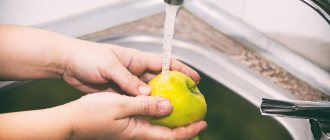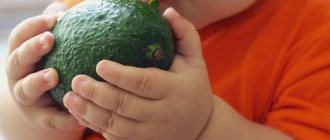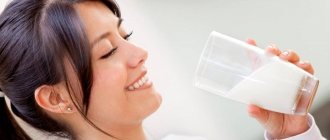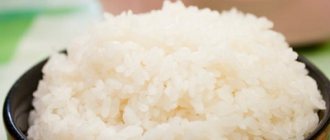Breastfeeding during poisoning
First of all, you need to understand what kind of poisoning we are talking about. If a nursing mother has been poisoned by chemicals or a large dose of any medication, then in this case it is impossible to give the baby breast milk. After all, most medications and toxic chemical compounds are absorbed into the blood and easily enter the mammary glands.
In case of food poisoning (or toxic infection), you can breastfeed your baby without fear. This disease is caused by bacteria and their waste products that enter the gastrointestinal tract (GIT) from poor-quality, expired or poorly washed food. The microorganisms themselves do not enter the bloodstream, and their toxins are only partially absorbed and practically do not penetrate the mammary glands. In addition, from the first day of illness against pathogenic microbes, the mother’s body begins to produce antibodies, which are passed on to the baby through milk. This process contributes to the proper development of the infant's immunity.
Important!
If a woman has to take serious antimicrobial medications to fight an infection, breastfeeding should be suspended during treatment.
When to resume breastfeeding
The pediatrician decides whether to continue feeding. You can give your baby breast milk only after the body has cleansed itself of toxins. The absence of symptoms such as nausea, stool upset and vomiting in a nursing mother does not always indicate that the body is completely restored and there are no harmful substances in the milk. It is important to undergo the necessary examinations, adhere to the prescribed treatment and diet.
In some cases, hospitalization is advisable. In case of poisoning, the suggestion of health workers to go to the hospital is most likely justified, and it is better to receive qualified medical care under the continuous supervision of specialists.
In case of severe intoxication, one drink will not be enough. Infusion therapy may be required in a hospital setting.
Symptoms
Symptoms of food poisoning appear within 2 days after eating low-quality food. A woman appears:
- Diffuse abdominal pain;
- Severe nausea and repeated vomiting;
- Repeated loose stools;
- High fever;
- General malaise, weakness;
- Pain in the temples, joints, muscles as a manifestation of intoxication syndrome.
Causes of poisoning
What can cause food poisoning? The main factor in this condition is the consumption of low-quality products, for example, those with an expired expiration date or damaged packaging. Other reasons:
- eating food with dirty hands;
- unwashed vegetables and fruits;
- undercooked fish, meat or eggs;
- using contaminated water for washing food or drinking;
- consumption of dairy products or sweets with cream and filling that have expired or the storage rules were incorrectly followed;
- poisonous berries and mushrooms;
- consumption of low-quality alcohol;
- consumption of canned products that were manufactured in violation of the technological process.
Experts identify several types of food poisoning:
- Food poisoning - it is caused by toxins that are in an expired product. A severe form of this condition is botulism.
- Intestinal infections - caused by bacteria, such as salmonella.
Nausea and vomiting are the main signs of intoxication
Treatment rules for breastfeeding
Mild poisoning can usually be managed without taking antibiotics. The sooner you start treatment, the higher the chance of defeating the disease on your own.
Drinking regime
To relieve intoxication, drink at least 2 liters of fluid per day. Non-carbonated mineral water or weak herbal tea will do. You will have to temporarily give up soda, coffee, and fruit juices.
If repeated diarrhea and vomiting are observed, then to replenish the volume of electrolytes and carbohydrates, you need to use oral rehydration products - Orosan, Gastrolit, Rehydron.
In case of constant vomiting, you need to drink in small portions, but more often, in order to get the required volume of liquid without provoking vomiting. Water that is preheated to body temperature (about 37 °C) is absorbed most quickly.
Diet for poisoning
On the first day of food poisoning, it is recommended to observe complete fasting. If the disease is mild, then it is permissible to have a small snack with soaked crackers, oatmeal or rice porridge cooked in water.
In the future, a strict gentle diet is indicated, which involves avoiding heavy and irritating foods to the gastrointestinal tract. These include:
- Fatty meats and fish;
- Pickles and marinades;
- Smoked meats;
- Fried foods;
- Spicy seasonings;
- Raw fruits and vegetables;
- Alcoholic drinks.
It is best to eat steamed lean dishes, oatmeal, buckwheat, rice porridge, and jelly.
The doctor's consultation
A doctor's examination is needed in the following cases:
- Diarrhea and diarrhea do not stop, and there is a risk of dehydration;
- Lethargy and depression of consciousness are observed;
- Vision is impaired;
- The high temperature persists, which cannot be brought down with standard antipyretics;
- An admixture of blood appears in the vomit or feces.
Before starting treatment, be sure to notify your doctor that you are breastfeeding.
Rest
In case of food poisoning, a woman is advised to go to bed. If there is an assistant in the house (husband, grandmother, grandfather, nanny), then it is better to limit the mother’s contact with the child only during feeding periods.
If the mother has to cope alone, then most of the time she should be in bed, if possible, with the baby next to her. Keep his attention busy with an interesting toy or picture book. When the baby sleeps, it is advisable to fall asleep with him.
Treatment methods
If the problem is not very acute, you can cope with the treatment yourself. Even a mild form of deterioration of the condition that does not go away for more than a day should be a reason to consult a doctor.
You need to know the basic rules for providing assistance. It is worth resorting to them even in acute forms, before the arrival of doctors. It is strictly not recommended to use any serious medications without a doctor’s prescription during breastfeeding.
Home treatment for food poisoning is acceptable for mild forms of the disease.
Basic measures to help you cope with the problem yourself:
- Stomach cleansing;
- Induce vomiting.
Using liquid and salts, perform gastric lavage. Medicinal enemas also help.
The drinking regime should be made more abundant with a glucose solution and the use of medicinal water. It is acceptable to use drugs such as “Regovedron”, “Smecta”.
Tea made from medicinal herbs and dill water will help cope with attacks of nausea.
It is permissible to use drugs that normalize the microflora of the body. Paracetamol and ibuprofen will help reduce fever. Medications must be taken an hour or more before feeding. The measure will reduce the content of the drug in breast milk.
Severe conditions require medical intervention. Any medication must be used after a doctor’s prescription. The safety of the product for an infant with hepatitis B should be discussed with the attending physician.
Feeding precautions
To prevent the infection from being transmitted from mother to baby, during illness special attention should be paid to the rules of personal hygiene:
- Wash your hands every time before picking up your baby, expressing milk, or preparing complementary foods.
- Do not dry your baby with your towel.
- Do not let your baby drink or eat from your dishes, and do not try feeding him with a spoon.
- Rinse your mammary glands before feeding.
- If you place your baby on your bed, place a diaper on top of the bedding.
Prevention of intoxication during hepatitis B
It is possible to avoid poisoning during hepatitis B. It is necessary to properly store food and adhere to personal hygiene rules. When preparing food, use utensils washed with disinfectants. A woman should have several cutting boards (for fish, meat, bread, vegetables).
Frozen foods thaw naturally. When purchasing and storing, check the expiration date of products. Store them in the refrigerator in packaging (container, bag). Wash eggs before cooking, soak vegetables for 15 minutes in water with apple cider vinegar (3 tbsp. l/l) before eating. Wash in running water.
Methods of treating intoxication in nursing mothers
A mother will be able to calmly feed her baby breast milk only if she feels normal. And for this, first of all, you need to relieve intoxication syndrome.
Method of gastrointestinal lavage
You can rinse your stomach at home by artificially inducing vomiting. To do this, first drink at least a liter of still water. Then you need to bend over the toilet and press the pads of the 2nd and 3rd fingers on the base of the tongue or on the back wall of the throat. This will provoke a gag reflex and the removal of food contaminated with bacteria and their toxins from the stomach.
Note!
It is advisable to artificially induce vomiting only within 2 hours after eating. If more time has passed, then toxins have time to be absorbed into the bloodstream, and most of the food is evacuated from the stomach.
After vomiting, you should rinse your mouth with water to wash away the hydrochloric acid that has entered the stomach cavity.
Detoxification methods using sorbents
Enterosorbents are drugs that bind bacteria and the toxins they secrete, and then quickly remove them from the body, preventing damage to the gastrointestinal tract. Another useful property of sorbents is the antidiarrheal effect. These are the safest medications to combat poisoning that you can safely drink during lactation.
The most effective and easy-to-use sorbing agents are smecta, polysorb, enterosgel. You should drink them until all symptoms of the disease subside.
Symptomatic treatment
To normalize body temperature during lactation, ibuprofen and paracetamol are allowed. It is advisable to reduce the temperature if it exceeds the threshold of 38.5 °C. In other cases, it performs a protective function.
To combat diarrhea, it is possible to prescribe enterol containing Saccharomycetes. The average duration of treatment with this drug is 7 days.
The most popular anti-diarrhea drug, Imodium, is not advisable to drink while breastfeeding. We can only take it once.
Antispasmodics (no-spa, drotaverine) and antiemetics (cerucal, motilium) are also allowed to be taken 1-2 times. At this dose, they will not be able to harm the baby, even if they get into the milk.
There are some antibacterial agents that are allowed during breastfeeding. These include, for example, the intestinal antibiotic alpha normix. However, such treatment must be agreed upon with a doctor.
Preventive measures for breastfeeding women
To avoid having to treat poisoning during breastfeeding, the easiest way is to pay attention to preventive measures:
- Wash vegetables, fruits, eggs thoroughly before eating;
- Throw away products that have passed their expiration date;
- Wash your hands before every meal;
- Rinse dirty dishes well;
- Do not buy shelf-stable products whose packaging has been damaged;
- Do not drink unboiled water from questionable sources;
- Thoroughly boil and fry meat and fish dishes;
- If food has an unpleasant odor or tastes unusual, it is better to avoid it.
Emergency measures
Emergency care for food poisoning in a nursing mother involves gastric lavage and taking enterosorbent. If a woman is poisoned by medications or toxic chemicals, you should immediately call an ambulance, and while waiting, also induce vomiting.
Attention!
Do not try to rinse your stomach yourself if you are poisoned with aggressive solutions of acids and alkalis. Their repeated passage through the esophagus will intensify its chemical burn.
Can a baby be poisoned by mother's milk?
For a child who has just been born, there is nothing healthier than mother's milk. After all, for proper development, the formation of immunity and all vital systems of the body, breast milk. It is a great source of hormones, antibodies, beneficial bacteria, immunoglobulins, minerals and enzymes. No formula compares to mother's milk.
But a nursing mother is not immune from poisoning, even if she believes that she takes good care of her diet. Sometimes, the source of infection is not at her home, but in the store. You should carefully study the composition and look at the expiration date of the purchased products.
If, after all, the mother experiences poisoning while breastfeeding, then there is no need to think about stopping it. Doctors say that mother's milk contains living organisms that can have a beneficial effect if bacteria enter the child's body during breastfeeding. Some of these substances will bind and remove pathogenic bacteria from the body, while others will strengthen its immunity. The harm to the baby is insignificant when compared with the benefits received.










